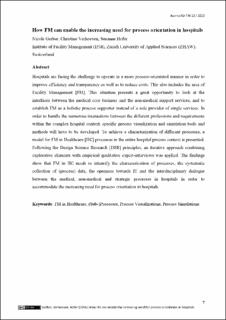Please use this identifier to cite or link to this item:
https://doi.org/10.21256/zhaw-1489Full metadata record
| DC Field | Value | Language |
|---|---|---|
| dc.contributor.author | Gerber, Nicole | - |
| dc.contributor.author | Verhoeven, Christine | - |
| dc.contributor.author | Hofer, Susanne | - |
| dc.date.accessioned | 2017-12-05T14:52:00Z | - |
| dc.date.available | 2017-12-05T14:52:00Z | - |
| dc.date.issued | 2016 | - |
| dc.identifier.issn | 2415-1858 | de_CH |
| dc.identifier.issn | 2520-5404 | de_CH |
| dc.identifier.other | urn:nbn:at:at-ubtuw:4-2435 | de_CH |
| dc.identifier.uri | https://digitalcollection.zhaw.ch/handle/11475/1708 | - |
| dc.description.abstract | Hospitals are challenged to operate more process orientated in order to gain efficiency and transparency as well as to reduce cost. This also includes the area of Facility Management (FM), which is a key element for successfully operating hospitals. This situation offers a great opportunity to look at the interfaces between the medical core business and the non-medical support services and to establish FM as a holistic process supporter instead of a sole provider for single services. In order to handle the numerous interactions between the different professions and requirements within the complex hospital context, specific process simulation tools and methods will have to be developed. This approach requires the generation of a big number of systematic data. On the basis of the KPI model for non-medical support services (KPImoS) and the corresponding process model (PromoS), a new model as a basis for simulating FM processes is thus presented. The model combines the view of the patient process as well as three different FM process types: FM processes with a direct contact with the patients such as catering and transport, FM processes which are provided upon specific request and can thus be allocated to a specific area such as procurement or maintenance of medical mobiles and overall FM-processes without a specific cost allocation to a single orderer such as maintenance of the building or cleaning of general areas. An extensive literature review on the subjects of process modelling and process simulation is the basis of the research approach. Following the Design Science Research principles, an iterative approach combining qualitative field observations and an explorative approach with expert interviews was chosen. This project shows that FM in Healthcare needs to intensify the systematic collection of data in order to become ready for comprehensive process simulations. Only with IT-supported simulation tools, can the very complex processes in hospitals be optimized in a holistic approach in the future. In addition, the process simulations shall also support a more intense cooperation between the FM and the core business in the future. | de_CH |
| dc.language.iso | en | de_CH |
| dc.publisher | Technische Universität Wien | de_CH |
| dc.relation.ispartof | Journal für Facility Management | de_CH |
| dc.rights | https://creativecommons.org/licenses/by-nc/2.0/ | de_CH |
| dc.subject | FM in healthcare | de_CH |
| dc.subject | Sub-process | de_CH |
| dc.subject | Process visualization | de_CH |
| dc.subject | Process simulation | de_CH |
| dc.subject.ddc | 362.11: Krankenhäuser und verwandte Einrichtungen | de_CH |
| dc.subject.ddc | 658.2: Facility Management | de_CH |
| dc.title | How FM can enable the increasing need for process orientation in hospitals | de_CH |
| dc.type | Beitrag in wissenschaftlicher Zeitschrift | de_CH |
| dcterms.type | Text | de_CH |
| zhaw.departement | Life Sciences und Facility Management | de_CH |
| zhaw.organisationalunit | Institut für Facility Management (IFM) | de_CH |
| zhaw.publisher.place | Wien | de_CH |
| dc.identifier.doi | 10.34749/jfm.2017.2435 | de_CH |
| dc.identifier.doi | 10.21256/zhaw-1489 | - |
| zhaw.funding.eu | No | de_CH |
| zhaw.issue | 13 | de_CH |
| zhaw.originated.zhaw | Yes | de_CH |
| zhaw.pages.end | 19 | de_CH |
| zhaw.pages.start | 7 | de_CH |
| zhaw.publication.status | publishedVersion | de_CH |
| zhaw.volume | 2016 | de_CH |
| zhaw.publication.review | Peer review (Publikation) | de_CH |
| Appears in collections: | Publikationen Life Sciences und Facility Management | |
Files in This Item:
| File | Description | Size | Format | |
|---|---|---|---|---|
| 2016_Gerber_How FM can enable_Journal of FM.pdf | 5.34 MB | Adobe PDF |  View/Open |
Show simple item record
Gerber, N., Verhoeven, C., & Hofer, S. (2016). How FM can enable the increasing need for process orientation in hospitals. Journal Für Facility Management, 2016(13), 7–19. https://doi.org/10.34749/jfm.2017.2435
Gerber, N., Verhoeven, C. and Hofer, S. (2016) ‘How FM can enable the increasing need for process orientation in hospitals’, Journal für Facility Management, 2016(13), pp. 7–19. Available at: https://doi.org/10.34749/jfm.2017.2435.
N. Gerber, C. Verhoeven, and S. Hofer, “How FM can enable the increasing need for process orientation in hospitals,” Journal für Facility Management, vol. 2016, no. 13, pp. 7–19, 2016, doi: 10.34749/jfm.2017.2435.
GERBER, Nicole, Christine VERHOEVEN und Susanne HOFER, 2016. How FM can enable the increasing need for process orientation in hospitals. Journal für Facility Management. 2016. Bd. 2016, Nr. 13, S. 7–19. DOI 10.34749/jfm.2017.2435
Gerber, Nicole, Christine Verhoeven, and Susanne Hofer. 2016. “How FM Can Enable the Increasing Need for Process Orientation in Hospitals.” Journal Für Facility Management 2016 (13): 7–19. https://doi.org/10.34749/jfm.2017.2435.
Gerber, Nicole, et al. “How FM Can Enable the Increasing Need for Process Orientation in Hospitals.” Journal Für Facility Management, vol. 2016, no. 13, 2016, pp. 7–19, https://doi.org/10.34749/jfm.2017.2435.
Items in DSpace are protected by copyright, with all rights reserved, unless otherwise indicated.